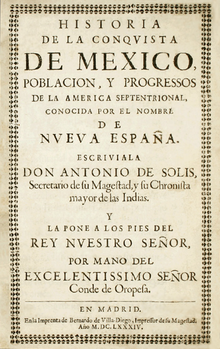Antonio de Solis and Rivadeneyra
Antonio de Solís y Rivadeneyra (Alcalá de Henares, July 18, 1610 - Madrid, April 19, 1686) was a Spanish writer of the Calderón school, chronicler of the Indies.
Biography
He was the son of Juan Gerónimo de Solís Ordóñez, Torralba, a native of the diocese of Cuenca, and Mariana (or Ana María) de Rivadeneyra y de la Vega, from the imperial city of Toledo. According to the author of the anonymous "Life of Don Antonio de Solís..." preceding his Various poems..., perhaps the editor Juan de Goyeneche, was a gifted child. He studied rhetoric, philosophy and canons in Alcalá and Salamanca, although even then he was given to verses and theater, and from the age of twenty-six moral and political sciences. He found a generous patron and protector in the VII Count of Oropesa, Duarte of Toledo and Portugal, Viceroy of Navarre and later of Valencia, whom he also served as secretary. To celebrate in Pamplona the birth of his heir to the title, Manuel Joaquín Álvarez de Toledo y Portugal, he wrote the comedy Eurídice y Orfeo in that city in 1642. Felipe IV honored him by making him an officer of his Secretariat of State, but dismissed the position and transferred it to a relative. The queen mother, however, returned to give him that position and also made him Senior Chronicler of the Indies. Solís, now fifty-seven years old, was ordained a priest, making friends in the Society of Jesus, particularly Diego Jacinto de Tebar. He was a member of the Congregation of Slaves of Our Lady of Exile, in whose chapel of the Convent of Santa Ana he is buried, and he distanced himself from profane compositions. He even refused to write autos sacramentales for the town of Madrid when Pedro Calderón de la Barca died.
She wrote her first comedy at the age of 17, with the title Love and Obligation. He followed the teaching of Pedro Calderón de la Barca and presents artificial love scenes like this one, but he has a certain satirical and costumbrist inclination alien to his model and a more plain language. His theater is satirical in tone, especially in love themes, the cause of which he examines in objective and sometimes cynical terms, unlike the chivalric tradition of the Spanish golden comedy. This was much celebrated in the century after his death, when his work was preferred to other classics. His works are La Gitanilla de Madrid, A fool makes a hundred, Doctor Carlino. His most famous theatrical work is El Amor al uso , an agile and fun comedy, highly successful in its day and translated into several languages ( L & # 39; Amour a la Mode by Scarron). He also wrote Gongorian-style poetry, both sacred and profane, and letters. Together with Pedro Calderón de la Barca, he translated and adapted Il pastore Fido by Giovanni Guarini.
As a historian, he is remembered for his History of the conquest of Mexico, population, and progress in northern America, known as New Spain (1684). As vate, he left mystical work, mocking verses, various praises and circumstantial works.
He was secretary of the Count of Oropesa, viceroy of Navarra and Portugal, official of the Secretary of State and, on the death of Antonio de León Pinelo, he was appointed Senior Chronicler of the Indies and wrote his Historia by royal commission of the Conquest of Mexico in 1684, which is inspired by previous accounts by Cortés, López de Gómara and Bernal Díaz. The narration is artificial and erudite, perhaps because the author was never in America, unlike previous chroniclers.
He also wrote a large number of Letters (BAE, XIII) and Juan de Goyeneche compiled his work in verse in Sacred and Profane Poems, which he left written (although not together or retouched). Don Antonio de Solís y Ribadeneyra (1692).
He was chaplain of the congregation of Nuestra Señora del Destierro. In 1667 he was ordained a priest and retired to the contemplative life.
Theatrical play
- Love and obligation (1626)
- Love of use (1640)
- Eurydice and Orpheus (1643)
- Love the enemy (1651)
- The closing of the secret (1651)
- A bobo a hundred (1651)
- The amazons (1655)
- La gitanilla de Madrid (1656)
- Triomphs of love and fortune (1657)
- Doctor Carlino
- You train the married without knowing (1659)
- Translation and adaptation Pastor Fido by Giovanni Guarini (with Pedro Calderón de la Barca)

